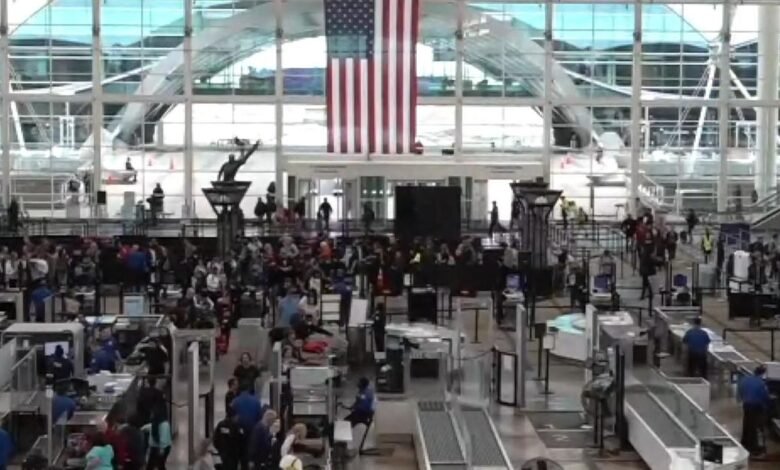Memorial Day weekend 2024 could break travel records. Here’s what you should know

Although there is technically still another month of spring to go, travelers often see Memorial Day weekend as an unofficial kickoff to the summer season – and the traffic clearly reflects that. Based on current forecasts, travel around the 2024 holiday next Monday, May 27, is not expected to alleviate Memorial Day from its bad reputation with airline drivers and passengers. In fact, they can find themselves on some of the busiest highways and flights they’ve seen in decades.
The American Auto Association, or AAA, warned of potentially unprecedented congestion on the roads this weekend, along with airports that could be even more crowded than in previous years. The organization, which analyzes various economic factors and partners with other groups to project travel conditions, announced earlier this month that about 43.8 million people in the United States would likely travel at least 50 miles from Thursday through Monday. This would represent a 4% increase in overall travel compared to 2023, according to AAA. It would also come close to the busiest Memorial Day weekend on record, which took place in 2005, when 44 million people left their homes for the holiday.
“We haven’t seen travel numbers like these on Memorial Day weekend in nearly 20 years,” said Paula Twidale, senior vice president of AAA’s travel division, in a statement. “We are projecting one million more travelers this holiday weekend compared to 2019, which not only means we are surpassing pre-pandemic levels, but also signals a very busy summer travel season ahead.”
For anyone planning to hit the road or hop on a plane this weekend, here’s what you should know.
Prepare to hit traffic
Memorial Day weekend in 2024 is expected to set a new record for road travel, according to AAA. The organization estimated that 38.4 million people will travel by car over the weekend, which would be the highest number recorded for this particular holiday since the group began tracking Memorial Day travel patterns in 2000. The car rental company Hertz said AAA says rental demand this year will be highest in Atlanta, Boston, Las Vegas and Orlando, with most renters scheduled to pick up their cars on Thursday and Friday.
In general, drivers who want to avoid traffic, or at least experience less of it, should stay off the roads during the afternoon on any day over the long weekend. Citing INRIX traffic data, AAA said the worst times to travel by car, in any US time zone, are between 12pm and 6pm on Thursday, between 12pm and 7pm on Friday, between 2pm and 5pm on Saturday, between 3pm and 7pm on Sunday and between 3pm and 7pm on Monday. The best times to drive will be before 11am or after 7pm on Thursday, before 11am or after 8pm on Friday, before 1pm or after 6pm on Saturday, before 1pm on Sunday and after 7pm on Monday- fair.
Airports will be crowded
Airports across the country are bracing for another surge in travelers, following an upward trend in flights booked around Memorial Day since last year’s air travel numbers exceeded pre-pandemic levels. An estimated 3.51 million people will fly this weekend, according to AAA, an increase from the 3.35 million who flew to their destinations last year. If as many people fly as expected, this will be the busiest Memorial Day weekend at airports since 2005, when AAA said 3.64 million people took flights for the holiday.
United Airlines said more than 500,000 people are expected to fly each day from Thursday through Tuesday, which would be the airline’s busiest Memorial Day weekend on record. Delta said it expects 3 million people to fly on its planes during that six-day period and American Airlines said it expects 3.9 million people to fly over the weekend.
Public transport tips
Any of the projected 1.9 million people using public transit systems to get where they’re going this weekend can also plan ahead. INRIX projections show that subway riders will experience a degree of congestion in major cities, including Atlanta, Boston, Chicago, Denver, Detroit, Houston, Los Angeles, Minneapolis, New York, Philadelphia, Portland, Oregon, San Diego, San Francisco, Seattle, Tampa and Washington, D.C. Subway congestion is expected to peak in these locations in the late afternoon, early evening and mid-morning each day between Thursday and Monday.
Forecasts suggest that DC, Los Angeles, Houston and Tampa will see the biggest jumps in metro capacity compared to their respective norms. The worst is predicted for a route from Gainesville to Tampa, where INRIX said subway congestion on Sunday at 9 a.m. local time could be 88% higher than normal.
Kris Van Cleave contributed reporting.




